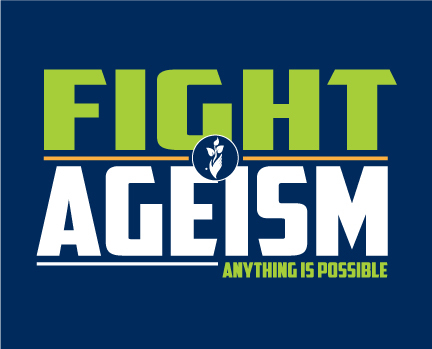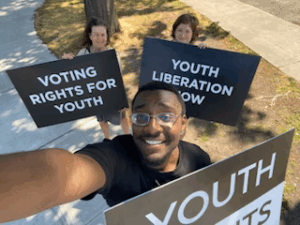I was pleased to come across this article in the Washington Post today about the struggle against ageism. The article profiled Ashton Applewhite, an author and advocate, who runs a site called This Chair Rocks. Applewhite focuses primarily on discrimination against the old, but she doesn’t do so myopically. Her website, and the Post article, both mention that “ageism cuts both ways”. This is very welcome and encouraging. Even though she says, “in a youth-obsessed society olders bear the brunt of” ageism (which we in the youth rights movement strongly disagree with), Applewhite could be a good ally.
Recognizing the harm that ageism causes to both the young and the old should be an important task of our movement. We are stronger when we make common cause with opponents of ageism against all people, young and old. This is why NYRA has always preferred using the term “ageism” to describe the oppression and discrimination youth face instead of terms like “adultism” or “childism” or “ephebephobia”. The opportunities to ally and partner with activists like Ashton Applewhite (and others) are essential to our movement’s growth. This isn’t to say that NYRA should start tackling instances of ageism directed at the old (any more than we should expect the AARP or Applewhite to refocus their efforts to the young), but that we all work together where possible and recognize that we are all together in the battle against age discrimination and age segregation.
This is what has always unsettled me about terms such as adultism & childism, they further segregate us. They sever the link we have to discrimination against the old. They are useful as a subset of ageism that can be deployed in situations that require more nuance and specificity, but outside of such specialized situations they shouldn’t be used. I have my reasons.

NYRA’s goal has always to make this a mass movement for youth rights. The support of sociologists or academics are helpful, but our arguments, our language and our action needs to be geared toward the common man (and woman, and boy, and girl). The way to introduce new ideas and new concepts to people is to link up with ideas they are already familiar with. If I were trying to explain to someone what a Coypu was, it would make the explanation much clearer if I started off by saying it was similar to a beaver. The same with discrimination against youth. Our starting place should be drawing comparisons to forms of discrimination that most people understand and oppose, like racism and sexism.
Using the term ‘ageism’ helps us do that. Race discrimination = racism, sex discrimination = sexism, age discrimination = ageism. Very simple, very clear. Whenever I talk to individuals, of any age, who are just discovering or thinking about youth rights for the first time the word their thoughts coalesce around is always ageism. It just makes sense. When I was 16 and thinking for the first time in an organized way about the discrimination I faced I labeled it ageism. Many others do too.
I did an informal study a few months ago on Twitter, looking for uses of “ageism” and uses of “adultism”. While most uses of the term ageism was to refer to ageism experienced by the old, more people still used the term ageism to refer to anti-youth prejudice than used the term adultism. In fact one of the most common uses of the word adultism on Twitter was to refer to the idea of doing adult things, (in the sense of: “Ugh, I’ve had enough of paying bills, I just can’t adult anymore.” Or “Fixing a leak in my bathroom #adultism”). The other most common… well, it is a porn site.
All in all, in a 24-hour span #ageism was used 26 times clearly to refer to anti-youth prejudice and adultism (without the hashtag) was used 11 times. People are already using ageism, let’s make the movement accessible to them instead of excluding them with insider language.
No one but some PhD student in child studies would come up with adultism or childism on their own. They are too wonky. To most people hearing it for the first time they conclude that ‘adultism’ is discrimination against adults. We can’t afford that kind of confusion.
Heck even academics can’t even agree on the definitions or usage of adultism or childism. I’ve heard some very well thought out and supportive writers use childism in a pro-youth way, like feminism, and others use it to describe discrimination against youth. If they can’t even agree, then what about the rest of us?
Beyond just the confusion in the terms, using wonky words also makes the cause seem less serious & real. A few months ago the University of Missouri received some attention for a glossary of inclusive terminology. There were a lot of very specific, very uncommon terms on how to be more inclusive and politically correct. Bloggers & media outlets who really hate the idea of being PC latched on to the list and held it up for scorn and mockery. They had a lot of terms to pick from, but the one they latched onto the most was adultism. They found it the most ridiculous. We have enough problems explaining the justice and importance of this cause, we shouldn’t let funny sounding terms trip people up.
So, in summation:
1. Ageism is a more commonly used term by our members and potential members
2. Ageism is a more easily understood term
3. Ageism isn’t the name of a porn site
4. Ageism sounds like a more serious, credible term
5. Ageism makes common cause with older victims of age discrimination






Hi, old pal. I’ve been extra annoyed lately at the tendency of reporters, editorialists, and reader-commenters to compare Trump to children of various ages: “like a 6-year-old in the playground,” “has the knowledge of an x-year-old,” “behaves like an x-year-old bully,” etc., etc.
I’ve been trying to reply gently but pointedly (although the ageist comments are too numerous to address all of them).
I’ve suggested that, from now on, people of all ages who engage in insulting name-calling and crying “no fair” when challenged in any way be called “trumpish” (since there is no such thing as “childishness”).
And I’ve gotten a few upvotes, which is mildly cheering.